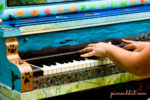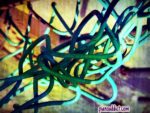Ahhh… High School
I remember my high school years as being a busy and mostly happy time. At last, I could incorporate music and theater into my school curriculum and into my after school activities–something which had never before been possible.
I worked backstage in theater productions, sang, played piano and coached for choirs, performed as Bea in Up the Down Staircase, learned to play the clarinet (so I would no longer have to play glockenspiel in Marching Band), and participated in orchestra, band, and the pit for musicals. I also took private piano lessons every week and one year of organ.
I was the music librarian, served on the Performing Arts Area Council, and ended my senior year with the Bank of America Award to Music and the Washington High School Performing Arts Area Senior Award. During my time as a WHS Husky, I was fortunate to receive the broad musical background which has stood me in good stead ever since.
At school, the emphasis was on being able to regurgitate a body of knowledge on tests. Classes were taught in a lecture/note-taking format. Even early level science classes contained no hands on experiences. One had to do well in the information based classes before being allowed into the lab classes. Imagine my surprise when I scored in the 93rd percentile on the the natural science portion of my SATs after being steered away from all the more advanced science classes.
Those who were skilled at memorization and testing were considered smart and talented. (I was not, having a mild form of dyslexia which remained undiagnosed until I was an adult and past my school years). Those who raised their hands to contribute a different connection to or view of the subject at hand were not necessarily looked upon with approval.
There were wonderful exceptions, as in the case of my English teacher who had me take independent study units rather than classroom English. We explored everything from Shakespeare to Evelyn Waugh. In most classes however, true discussions of many sides of an issue were rare. Mostly the teacher would say something like, “Today we are going to discuss ____. What do you think about ____?” followed by, “No that’s wrong!”
In the area of private piano study, I did not progress during those years. I was unmotivated to practice, especially in the area of improving the technical aspects of my playing. I entered college highly deficient in my major instrument but ahead in other aspects of my music requirements. After years of studying and teaching, I now know that I should have said YES all those times when my parents asked me if I wanted another teacher.
I didn’t know anything about musical style or how to practice my instrument creatively. The cure-all in my family and from my teacher was do it 100 times and it will get better. Still not better??? You are not trying. Interestingly enough the do it 100 times and it will get better philosophy was also the norm in my academic classes.
During my junior year, I was inadvertently given a valuable lesson about stereotyping which influences my teaching choices today. In World Geography we were given a multiple choice test about the Mysterious East. I missed a question that pulled my score down an entire letter grade. It was, of course, the gimme question and was meant to show that the teacher understood us teenagers.
The question? What middle eastern city was made famous by a rock song? The answer? Train to Marrakech. Since I didn’t have time to listen to the radio much, I didn’t have a clue. But, I didn’t fight it because I didn’t want my classmates to laugh at me. Today? I would have fought–and hard!
Why this post about high school? Well, I have quite a few students who are entering or continuing in high school. I hope I can provide for them all that the arts have given to me and have the wisdom to leave out all the other parts.


